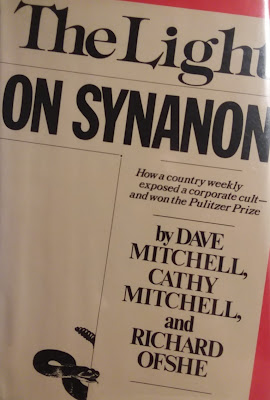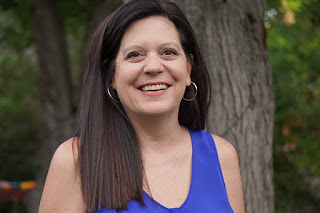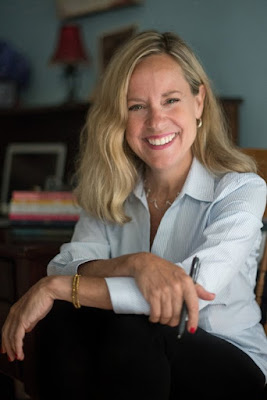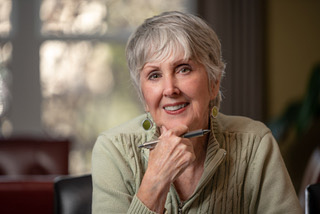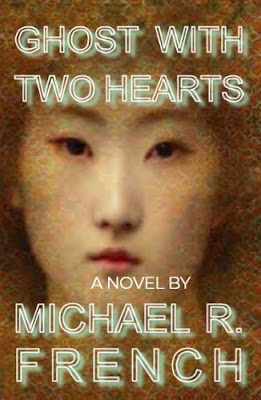Today I had the opportunity to interview Christine Wolf, host of the
Write to Heal Retreat. From May 9 - May 13, writers will congregate at the Civana Wellness Resort & Spa in Carefree, Arizona. It's a time to embrace self-care and reframe difficult memories through expressive writing.
Christine is a memoir coach and CEO of Writers' Haven LLC, a workspace for women writers. She is an award-winning freelance columnist with Tribune Media's ChicagoNow and a former opinion columnist with the Chicago Tribune. She also won a Moth StorySLAM in June of 2022.
I'm so excited to talk with her about this amazing writing retreat.
Register now! Registration closes on April 7, 2023, so don't hesitate.
--- Interview by Nicole Pyles
WOW: Thank you for chatting with me today about the Write to Heal Retreat! What inspired you to start this writing retreat, and what led you to hold it in Carefree, Arizona?
Christine: I've been hosting local writers' retreats near my home in Chicago for about 10 years. I'm always grateful to be in the company of other women writers, working independently while still being together, then gathering around a table at the end of the day to share insights and laughter, and even a few tears. There's nothing like connecting with writers during a retreat about our work-in-progress. I'm always so rejuvenated after the extended conversations and opportunities to exchange sincere feedback while exploring new perspectives and building new friendships.
Unfortunately, when Covid hit, my in-person retreats ended.
In 2021, as the pandemic world began to "reopen" I was nervously optimistic about reconnecting with the world. After such a confusing and uncertain time in history, my heart was pretty raw and tender, and I dreamed of ways to practice some serious self-care, like going somewhere sunny and getting some writing done. I'd never done anything like this for myself, so I felt guilty as hell for even considering it. Even though I was fifty-two and owned my own business and had a little bit of savings, I kept trying to justify my decision to take a trip that was "just for me." But, after a ton of research, I found a spot in Arizona that seemed almost too-good-to-be-true. It looked special—but, like, affordable-special. So, I took a huge leap of faith and booked myself a 3-day trip over Mother's Day weekend.
It was exactly what I needed: Sunny and easy to get to, lots of beautiful, comfortable spaces in which to write. The best part: I got to pick a couple of wellness classes every day at no additional charge. So, I tried things I'd never experienced before, like sound baths, aqua therapy circuits, Yoga Nidra, intention ceremonies, and walking through a nature labyrinth.
Overlooking the sunset during dinner one night, I noticed a table of women gathered nearby, many of them kind of leaning in, sharing a conversation that seemed... really sacred. And I thought, That's the kind of conversation I have with other writers when we're talking about our perspectives on life.
I was reminded how fortunate I am to be a writer, always observing life and documenting what I see and feel. I thought about how much I love interacting with writers — even when we're working independently, even when we're not talking about craft. With writers, it seems, I'm often my freest, most vulnerable and open self. We seem to view and reflect on the world in a unique and sacred way. And so, as I sat there, watching these women, I thought: If I, as writer, find this place magical, maybe other writers would feel the same?
The next year, I went back to Civana for another solo getaway, during which time I wrote and rested and hiked nearby. While at Civana, I worked with their staff on some initial ideas for a retreat, talking through what a program might look like. On my flight back to Chicago, I started planning the
2023 Write To Heal Retreat in earnest.
WOW: What an amazing journey! What can writers expect by joining your retreat?
Christine: The 5-Day retreat goes from Tuesday, May 9 through Saturday, May 13 — plenty of time to get home for Mother's Day (or just extend your stay).
From the start, we'll focus on the transformative impact expressive writing can make. We'll challenge ourselves to spend short periods of time (20 minutes max/day) writing about difficult memories and moving them from our heads to the page. All this happens in a warm and nurturing environment with the support of our team of writers and wellness professionals who offer their invaluable skills and compassion as we use writing to process and heal. You'll get to choose 2 wellness experiences every day from a selection of 100+ weekly options, including yoga, meditation, sound baths, aqua therapy circuits, and more. We'll have three group dinners and, to give you as much flexibility as possible, you'll receive a $300 food & beverage credit to use for any non-scheduled meal-times. There's also a world-class spa on site if you'd like to pamper yourself. Guests also receive a lovely welcome bag, including a small, personal journal, hand-crafted just for them.
Day 1: TUESDAY
After check-in, we'll gather for a brief welcome reception. Then, everyone's welcome to do their own thing for dinner. Head out to downtown Carefree or nearby Cave Creek, or stay at Civana and join me for a meal.
Days 2-4: WEDNESDAY/THURSDAY/FRIDAY
The heart of your Write to Heal Retreat includes...
...WorkshopsOptional workshops from 10:30-11:30 and 3:30-4:30, exploring topics like the Science of Expressive Writing (and how it improves physical, emotional, and interpersonal health), Mandala Meditation, Trauma-sensitive Care, Journeys of PTSD and Post-traumatic Growth, and Building Your Resiliency Toolkit.
...Wellness
Choose 2 wellness experiences/day from a weekly schedule of more than 100+ options.
...Nourishment
Breakfast & Lunch: On your own; use your $300 retreat food & beverage credit as you wish.
Dinner: Gather as a group for a wonderful, nutritious meal.
Day 5: SATURDAY
Enjoy 2 final wellness experiences before heading home restored and rejuvenated.
WOW: That sounds like an amazing experience! Why is it so important to the creative process to get away from it all and clear your mind?
Christine: It's no secret that, as women, we regularly put others' needs before our own. So, we often tend to lose our voice and our sense of self without even realizing it...until we show up irritable, resentful, tearful, or worse. But, just imagine turning off your racing mind and letting the sun wash over you. Imagine letting yourself get lost in thought, restoring and tending to your long-lost or blocked creative connections. When you give yourself some space that's just for you—free of guilt or justification that you deserve it—you leave empowered, restored, and more ready to navigate life.
WOW: I completely agree! Why is self-care so important for handling (and reframing) difficult memories that come up during the writing process?
Christine: Every one of us experiences difficult times, albeit some more difficult than others. It takes time to process those experiences, and when we do, writing is such an excellent tool to use. Make no mistake: writing about difficult memories isn't easy, but doing it in an environment designed specifically for self-care (and with a team that gets it) can help.
Humans can be such introspective creatures. Sometimes, we're not even aware of how much we notice, hold, and even unconsciously carry every day. Layer in some difficult memories, and we risk burnout and breaking points, where we just hit a wall or can't hold another thing in our hearts. And, when our overburdened hearts run out of room (or energy) to deal with the rest of life (including so much GOOD and BEAUTY), that's when self-care really offers an opportunity for release and transformation.
Think about it. Memories and emotions are held in our bodies, and when they're heavy, we feel heavy, especially when we have to work to keep things inside (or secret). When we give ourselves time to write about some of the toughest stuff, we often surprise ourselves. Though we assume it'll be nothing but agony and reliving pain, what tends to happen with expressive writing is that the act of writing things out isn't as horrifying as we think it'll be, especially if we give ourselves a short burst of time (20 minutes or less) to do it. We take those awful memories and put them into words that we can look at, delete, rip up, put away, or reorder in ways that make us feel more empowered and less flooded with overwhelm.
WOW: Those are such great insights. Getting in touch wit the emotions of those experiences is so freeing. You have such amazing successes under your belt. How has self-care and prioritizing your own healing aided in these successes?
Christine: Oh my gosh, that's so nice of you to say, and it's easy (and almost instinctive) for me to want to downplay the success and focus on all my challenges and missteps. But, self-care has really taught me how to say thank you—and to mean it.
Yep, I've had plenty of challenges that led to my anxious, hypervigilant response to life, and self-care taught me how to acknowledge them while keeping them in perspective, and to accept my experiences (even the toughest ones) with gratitude rather than frustration or a sense of victimhood.
For years, I never took the time to let myself really FEEL my feelings. I constantly kept myself "busy" and didn't know how to say no (to people, to work, to requests for help). My personal operating mode had one setting: REACTION. But then, when it dawned on me that my reactive stance was draining me and rooted in fear ("If I don't say yes, that person will think less of me..." "If I don't work harder, I'll lose my edge..." "If I turn down that invitation, I'll never be invited again..."), I asked myself what the alternative was, like, "Can I make decisions from a place other than fear?"
Once I realized I could, then I wanted to know HOW. The answer began with learning to value and love myself.
But how do we do that?
I felt grief and regret realizing that I'd spent so long prioritizing everything outside of me so that I could ignore my deepest feelings. And, I knew that a change in my behavior would surely have an impact on others. That really scared me. I worried how others would react, and that they'd see me as selfish. How ironic that, in my quest to find my own voice, I wrestled with guilt and worry about those who I might make feel uncomfortable by using it. It was a bit crazymaking...and I knew I had to break the cycle. I knew I had to make myself a priority before I could be my best, most decisive, and confident self.
When I accepted a weeklong writing residency, it felt like a treat...like walking through an unfamiliar door that I wasn't supposed to know about. I loved the freedom and the sense of agency I had to work on my craft and spend time in the company of other writers, but I also experienced some discomfort when my loved ones struggled with my time away and my decision to take time for myself. I felt pulled...hard...between two worlds. I questioned if I'd made the right choice. I didn't realize then that it was EXACTLY what I needed to do for everyone involved.
That first time away was less about self-care and more about making myself a priority. With that experience under my belt, I looked for more opportunities to carve out time for my own interests and needs. It felt kind of like cleaning out a messy old basement. I had to start with one section and build up my tolerance to tackle more. And then, once I got rolling, the benefits of my actions became more and more obvious. This time to myself wasn't frivolity. It wasn't being selfish. My intention wasn't to run from others or abandon them (though at times, others—and even my own mind—tried to convince me I was). This was making my needs a priority and clearing space for all the GOOD in my life.
When I took myself on that first trip to Civana in 2021, I sat in yoga classes, meditation sessions, and sound baths and let my mind wander to some memories and moments of struggle and pain. It wasn't easy, AND YET, instead of feeling upset, I felt relieved. I can't tell you how many tears I shed, filled with GRATITUDE and self-compassion for having survived those experiences.
Rather than keeping those painful memories tucked deep inside where they seemed to have so much power and control over me, I created space to let them rise up, and when that happened, I was ready to face them and remind myself that I'm not a victim: I'm a strong, resilient, empathetic woman who can offer some valuable wisdom to others. The way I choose to share that wisdom is through writing.
WOW: That's so powerful. I'm so glad you've shared that experience with us. What advice do you have for writers wondering if it's worth the cost to attend the retreat? What would writers be surprised to learn or experience from this retreat?
Christine: Until I'd created my own self-care retreat and experienced its long-term benefits, I had those very questions, too. Only when I dove into the research about the lasting benefits of self-care and all the many misperceptions about it (news flash: it's not hippy, dippy voodoo science) did I feel more comfortable parting with some money to do it.
Before I'd ever taken a self-care retreat, I'd taken myself on walks and drawn bubble-baths and used facial masks and changed my diet and gotten new haircuts to "boost my spirits"...but I'd never figured out a way to turn off my racing mind and just rest it. I mean, what a completely bizarre and unfamiliar concept.
I'd been caregiving and pushing down so many unpleasant memories for so long that I didn't even know there might be an alternative. By spending time in the company of others who understood the value and science of self-care (and taught me skills I could take home and start using immediately), I found that my relationships improved, my patience increased, and my ability to roll with life's challenges soared.
Study after study tells us how important self-care is. Still, I appreciate that self-care does require investment—of effort, of time, and sometimes, of money. We can do quick, low-commitment things to perk ourselves up, or we can invest in something deeply meaningful and lasting. After too many attempts at quick-fixes, I was ready to do something that made a long-term impact, not only on my own outlook but also on my ability to interact with others.
As for the financial investment, I asked myself how much a continuing education course might cost, or a solo escape to a sunny island, or a week off of work spent lying around and reading. When I ran the numbers and figured out the cost of a plane ticket and a resort bill, I was floored to realize that, by spending 4 nights at Civana, I'd get so much more than an "escape" or a "reset" or "time to myself". In addition to relaxing and resetting my overwrought nervous system, I would also learn new ideas and approaches. I'd immerse myself in time just for me, with reminders to offer myself tenderness, kindness, and nourishment. I left that first, self-designed self-care retreat at Civana feeling on top of the world. I felt lighter yet stronger. I also felt like I'd received the biggest hug from the person I needed it from most: Myself.
WOW: And sometimes that is exactly the hug we need! I love how there is something for everyone on this retreat! How did you plan this in a way that everyone has something to gain from the experience? What do you hope writers walk away with by joining you on this retreat?
Christine: I planned this retreat from many different perspectives—as a busy mom, as a solopreneur, as a trauma survivor, as a writer, and as someone who's been asked to carry the emotional weight of others. Each of those sides of me needs attention and tending and nurturing, so I found a place and designed a workshop that offers a multi-dimensional approach to healing. Sometimes I need physical activity...or community...or solace...or a beautiful place in which to write...or a healthy meal that I don't have to prepare...or a new way of looking at my life. This special retreat offers opportunities to address all those kinds of needs and more. Most of all, I hope writers leave this retreat feeling restored and also empowered to navigate their dynamic lives with actionable tools and increased confidence and peace in their hearts.
WOW: Thank you so much for your time, Christine!
Remember, register now for the Write to Heal Retreat. It closes on April 7, 2023, so don't hesitate.

